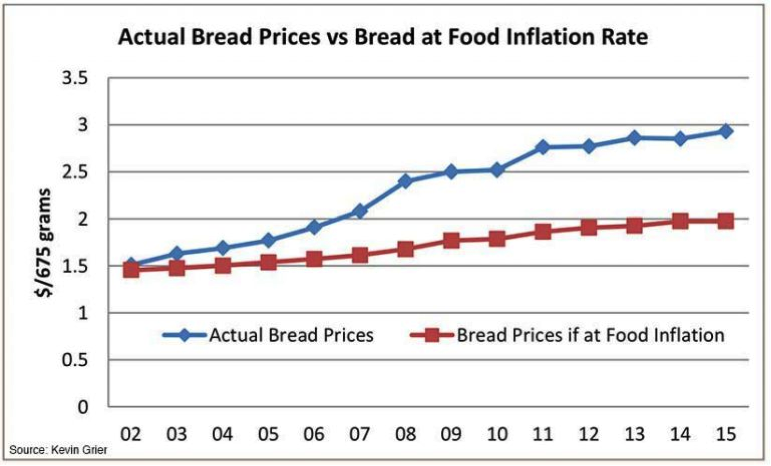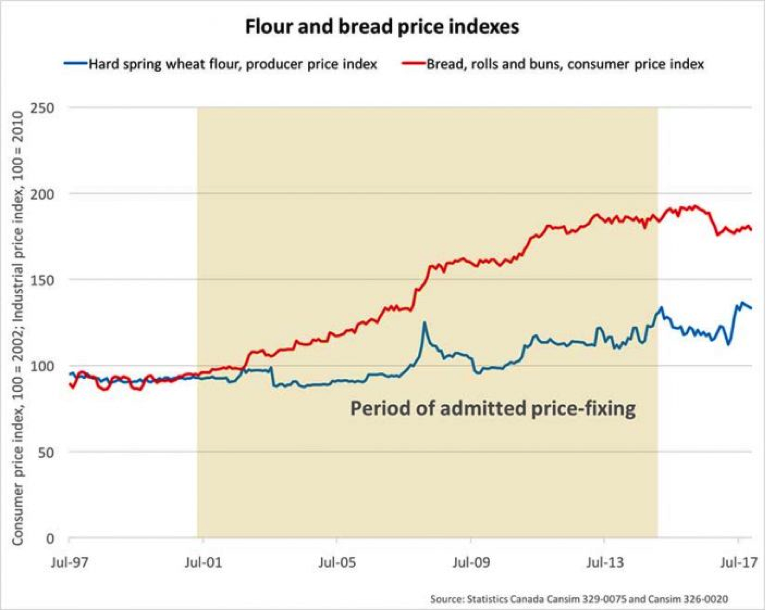A Crumby Deal: What you need to know about the Loblaws price-fixing scheme

By Sasha McNicoll, Coordinator of the Coalition for Healthy School Food
Much has been made of the Loblaws price-fixing scheme, which saw some of Canada’s largest food companies collude to artificially increase the price of bread from 2001 to 2015. The Competition Bureau is currently investigating seven companies: Canada’s three largest grocers, Loblaws, Metro and Sobey’s; its two largest bread-makers, Weston Bakeries and Canada Bread; and two large discount chains, Wal-Mart and Giant Tiger.
George Weston and Loblaw Companies put out a press release about their role, claiming their leadership was unaware and that the employees responsible were terminated. To compensate affected customers, Loblaws stated it would give out $25 gift cards as of January 8, 2018. The company estimates three to six million Canadians will take it up on this offer, costing it $75 million to $150 million.
But is this a genuine attempt at atonement or, as a complainant in one of seven pending class-action lawsuits has claimed, a “deceitful public relations” campaign?
Here’s what you need to know:
This may have cost you upwards of $400
MacLean’s reports that over the 14-year period this price-fixing occurred, the price of bread rose significantly more than the price of other foods, more than doubling from $1.42 per loaf in 2001 to $3.04 per loaf in 2015. Had the price of bread kept in line with the average inflation for other foods, it would have knocked a full dollar off the price of a loaf. MacLean’s estimates that this price-fixing has cost consumers who bought one loaf of bread per week nearly $400.
It is unlikely any of this profit went to Canadian farmers
The National Farmers Union reports that the price of a bushel of wheat is $6. With each bushel making 42 loaves of bread, Canadian grain farmers see about $0.14 per loaf. As seen in the chart below, the price of flour did not increase at nearly the same rate as the price of bread.
The Canadian food system is one of the most concentrated in the industrialised world
A market is considered concentrated when four firms control 40 per cent. Corporate concentration is especially high in food retail, in which the three largest companies control over 70 per cent of the market. Loblaw, the single largest food retailer, controls 29 per cent.
Paradoxically, collusion is more likely when a market is controlled by fewer companies: more competitive environments are less impacted by price-fixing as it is more difficult to get as much of the market involved.
Loblaws’ profits have increased year after year, but it is lamenting increases to the minimum wage
In its third quarter, Loblaws’ profits ballooned to $883 million and its revenue to $14.19 billion.
Despite these profits, when Ontario announced it was raising the minimum wage (from $11.40 to $11.60 in October 2017, then to $14 on January 1 and finally up to $15 on January 1, 2019), Galen Weston Jr. lamented this would cost his company $190 million (just over half the $350 million Loblaw may have to pay the Canada Revenue Agency for tax evasion), stating the company would have to find ways to cut costs, including increased automation. In 2017, Loblaws closed 22 stores and cut 500 corporate and store support jobs.
That the companies reported the scheme to the Competition Bureau rather than getting caught has given George Weston and Loblaw employees immunity from criminal charges.
The price-fixing scheme violated several sections of the Competition Act and may have constituted criminal conduct.
A social media campaign is encouraging people to donate their gift cards to a food bank, and, indeed, there are reports of food banks flourishing because of this
However it may be more helpful to use the gift card and donate $25 to your local food bank rather than the gift card itself: the Ottawa Food Bank has stated it prefers cash, as, by purchasing food in bulk through wholesalers, it “can turn $1 into $5 of food.” To find your local food bank, see here.
Of course, there is much debate about the efficacy of food banks to address food insecurity, so if you plan on donating your gift card, you may also want to consider writing an email to your MP to demand the federal government protect the right to food for all those living in Canada and act to prevent future collusion to artificially increase the price of food.
There is increasing scrutiny and concern about the role of corporations in our food system, and what they can do in terms of health, the environment and access. It will be an uphill climb for Canada's largest grocer to win back the trust of consumers.
- Log in to post comments



